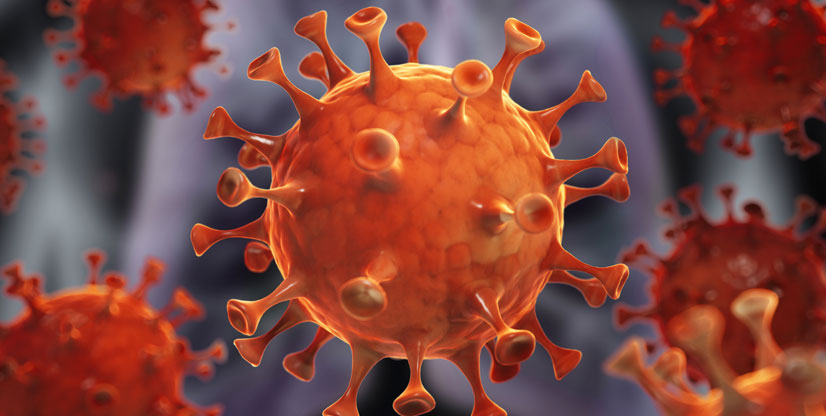COVID-19 Therapeutics: Japanese Study Shows That Short Chain Fatty Acids (SCFAs) Could Serve To Contain SARS-CoV-2 By Downregulating ACE2
Source: COVID-19 Therapeutics Jul 15, 2021 4 years, 6 months, 2 weeks, 5 days, 22 hours, 9 minutes ago
COVID-19 Therapeutics: A new study by researchers from University of Fukui-Japan shows that Short Chain Fatty Acids (SCFAs) could be used as potential therapeutics to treat COVID-19 and also to act as a prophylaxis. The researchers showed that SCFAs could downregulate ACE2 in epithelial cells.

According to the study team inflammatory endotype affects ACE2 expression in the nasal mucosa and influences susceptibility to SARS-CoV-2 infection.
Importantly, type 2 inflammation could downregulate ACE2 expression in the nasal mucosa and reduce susceptibility to SARS-CoV-2 in patients with CRSwNP.
The study findings showed that ACE2 mRNA expression was significantly decreased in nasal polyp tissue from patients with chronic rhinosinusitis compared with the expression in that from control subjects. SCFAs generated by gastrointestinal microbiota significantly reduced resting ACE2 expression in cultured airway epithelial cells. SCFAs also significantly suppressed the dsRNA-dependent upregulation of ACE2 expression in airway epithelial cells.
While more detailed studies are required, the study team proposes that administration of SCFAs to the nasal cavity might be worthy of consideration as a preventative or therapeutic strategy for the early-stage COVID-19.
The study findings were published in the peer reviewed American Journal of Rhinology & Allergy.
https://journals.sagepub.com/doi/10.1177/19458924211027798
The coronaviruses SARS-CoV and SARS-CoV-2 both bear 'spike proteins' which get inside our cells by binding to a protein called angiotensin-converting enzyme 2 (ACE2) that is found in our cells. However, the SARS-CoV-2 spike (S) protein has been found to have a higher binding affinity (10 to 20 times that of SARS-CoV) to ACE2, thus establishing a link between the pathogen and the protein.
Certain studies have significantly shown that patients with COVID-19 who have rhinosinusitis (i.e., inflammation of the nose) have a low risk of hospitalization.
https://www.jacionline.org/article/S0091-6749(20)30799-5/fulltext
Interestingly, the expression of ACE2 was reduced in patients with rhinosinusitis.
https://www.sciencedirect.com/science/article/abs/pii/S0091674920306473
Another study has shown that short-chain fatty acids (SCFAs), produced by bacteria in the gut have beneficial effects in allergy and viral infections.
https://www.nature.com/articles/s41467-019-11152-6
All these study findings prompted an investigation of the effect that SCFAs in the nasal cavity against SARS-CoV-2 infection by scientists from the University of Fukui, Japan, led by Dr Tetsuji Takabayashi.
The study team attempted to understand the effect of SCFAs on ACE2 expression in the nasal passage, and the potential impact on COVID-19 infection.
Dr Takabayashi told Thailand Medical News, "This is the first report that short-chain fatty acids (SCFAs) effectively reduc
e the ACE2 levels in human airway epithelial cells."
In order to understand the status of ACE2 expression in patients with allergies, the Japanese scientists studied the levels of ACE2 in the inner lining of the nose in patients with seasonal allergic rhinitis induced by Japanese cedar pollen (SAR-JCP) and chronic rhinosinusitis (CRS).
Utilizing techniques like real time-PCR to quantify the expression of ACE2, the study team found that there was no increase in ACE2 expression in in patients with SAR-JCP, whereas it was decreased in patients with CRS.
Subsequently in order to better understand the effect of SCFAs on ACE2 expression, the study team cultured nasal epithelial cells and exposed them to either SFCA and double-stranded RNA (similar to the nuclear material found in some viruses and known to enhance ACE2 expression). Upon examining the expression of ACE2, the researchers saw that the SFCAs had suppressed ACE2 expression in the presence of the RNA as well.
The study findings suggest that SFCAs has potential therapeutic applications against COVID-19.
Dr Takabayashi further explained, "The nasal mucosa exhibits the highest ACE2 expression among human organs and hence is a prominent target of original infection. Therefore, the development of strategies to downregulate ACE2 expression in nasal epithelial cells could reduce SARS-CoV-2 transmission and be useful as a novel therapeutic approach."
The team concluded that SCFAs could serve as an important
COVID-19 therapeutic agent in the fight against the COVID-19 disease.
For the latest on
COVID-19 therapeutics, keep on logging to Thailand Medical News.
